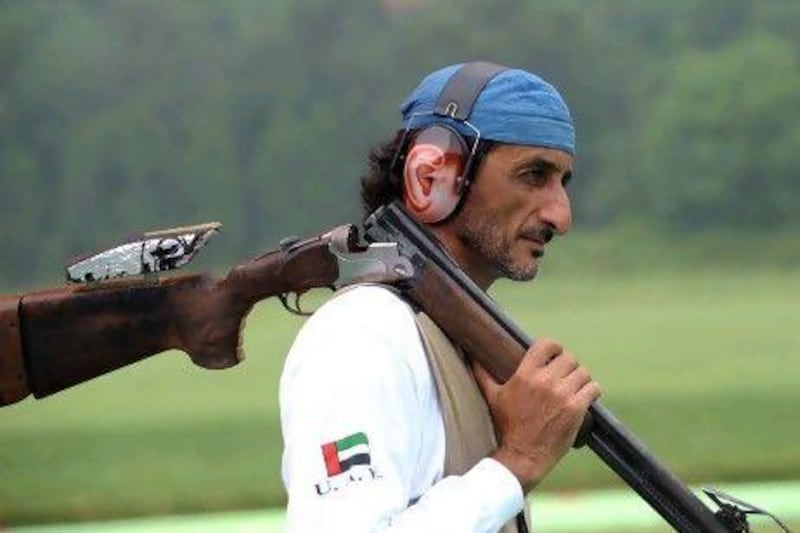Inspiring a generation, which is the catchy slogan of London 2012, need not cost the £9.3 billion (Dh53.7bn) the organisers have forked out on staging the Games in the English capital.
A couple of clicks on YouTube will do the trick. For proud Emiratis, a keyword search of "Sheikh Ahmed Athens gold" should suffice.
The footage shows Sheikh Ahmed bin Hasher taking aim at targets emerging from traps either side of a shooting range.
Then the two luminous orange clays dissolve into puffs of dust, he kisses the barrel of his Beretta shotgun, embraces his rivals. And there, in a neatly-packaged online nutshell, is the story of the UAE's greatest Olympic moment: the 2004 gold medal.
Accepted wisdom has it that success breeds success, but the UAE has yet to reap extended benefits from Sheikh Ahmed's golden day in Greece eight years ago.
The medallist, who has since retired from competitive shooting due to a heart condition and now coaches the sport, once said his triumph even had an adverse effect on him.
"To win a gold medal is both good and bad," he was once quoted as saying. "Good is you have won a gold, bad is you won't be so interested in the sport. When I won the Olympics and the world championship, I had everything. There's nothing to work for."
But for everyone else, there is everything to work for. The UAE has taken its largest ever Olympic team to the London Games, though the numbers are inflated by an entire football team, and each of them is driven by the dream of imitating Sheikh Ahmed's lonely triumph.
His impact is most obviously apparent in the shooting team. For the first time, the UAE have shooters qualified in three separate disciplines for London 2012.
Sheikh Saeed bin Maktoum, who carried the flag at last night's opening ceremony, is regarded as the country's best chance for a medal.
While football remains the national obsession, it is the shooters who are the country's leading sportsmen on the world stage.
"I remember it happening because my father used to be a shooter, and I remember him saying, 'My friend has just got an Olympic medal'," said Abdulla Omar, a 15-year-old Emirati who is regarded as one of the country's emerging shooting talents. "He was a friend of Sheikh Ahmed, and he became my role model. After that, I wanted to be like him; a great shooter." Omar was only seven at the time of the Athens Games, but it left an indelible mark. He now trains at the shooting club in Nad Al Sheba, a stunningly well-equipped range where Sheikh Ahmed himself oversees the development of the next generation of Emirati shooters.
"When I started shooting here, and I saw him shooting, I went and logged on and saw it on YouTube," Omar said. "He was really crying when he got the medal, he was so happy.
"Sheikh Ahmed is my role model and I want to be like him. I would be really happy to do that [win a medal] for my country.
"It gives you more experience when you shoot with Sheikh Ahmed. It makes you more confident. Sometimes when I first came shooting he would give me tips.
"The sport with the most medals and the only Olympic medal in this country is shooting. Football never got an Olympic medal."
Sheikh Ahmed's influence is not confined to his own sport. Emiratis from across the sporting spectrum, both within the Olympic family and outside it, regard his achievement as an inspiration.
Mubarak Salem, who will be the first Emirati to go in individual competition at London 2012 when he swims in the 100 metre breaststroke today, was a 16 year old making his way in swimming when his country first hit gold.
The swimmer's coach, Jay Benner, says Salem's commitment to his sport is the best he has encountered in his time in the country.
There is a reason his attitude is sound: Sheikh Ahmed once told him that is the only way progress happens. "I met him one time, and I talked with him," Salem said. "He said I have to remain focused on my training, keep the idea in my mind of what I need to do, and I will get there."
As an emerging Emirati cricketer, Alawi Shukri has represented the full UAE national team, while his father, Shukri Yahya, also played international football for the UAE. Yet he still regards the Olympics as the ultimate.
"Winning the gold brought attention to our country around the world," Shukri said. "He was our first man to get a medal, and it was gold, not even silver or bronze.
"We see that and it gives us adrenalin and makes us think we could do it. Not being a Sheikh, just as a UAE national to win a medal at the Olympics, there couldn't be anything better than that."
Shukri will fly to London today with the intention of watching the national football team face Great Britain at Wembley Stadium, Sheikh Juma bin Dalmouk Al Maktoum - Sheikh Ahmed's protege - compete in the double trap shooting, as well as Bethlem Desaleyn on the running track.
"For me as a sportsman we dream to be in the Olympics, whether cricket is in it or not," Shukri said.
"Winning a medal is something at a completely different level. To do that, from a country with such a small population, we are talking about the whole world here, so it makes us proud.
"That is why we are rooting for our football team, for Sheikh Juma, and for [Desaleyn] even if she originates from Ethiopia, she is carrying our flag."
Follow us
[ @SprtNationalUAE ]






